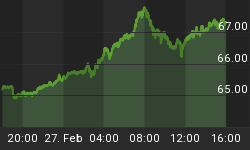A new year is upon us all, and with a five-day work week this week there is no longer any ignoring it. Markets were definitely more lubricated (and traders less so) on Monday than they were last week.
And so, as we return to full alertness, it is time to consider the recent trends and ask ourselves just what is going on. But before we do, I want to remind readers who missed the year-end series of "classics reposted" that they are worth some time to peruse if you still have time in the new year! A quick summary of those posts is here.
The only new data of the new year so far has been the ISM reports (Initial Claims was reported on January 2nd, but 'Claims in the few weeks around year-end are so noisy that they ought to be simply ignored). The Manufacturing report came out last week, and the survey at 57.0 remains at levels similar to that of early 2011. Today's Non-Manufacturing ISM was only 53.0, and actually closer to the lows of the last several years (see chart, source Bloomberg).

Be careful, though, how you interpret either the "strongest since early 2011" or "nearly as weak as it has been since 2010" readings. The ISM reports don't measure activity but rather the rate of change of that activity - so higher numbers don't indicate better growth, but more improvement in growth. Respondents are asked a question that is essentially "are things getting better or worse?" with sub-questions covering new orders, employment, and so on. So a high ISM number may mean that things are growing well, or it may mean that things were looking pretty grim but are now looking up. In either case, of course, we want to see bigger numbers but a high ISM now means more than a high ISM in 2010!
And the internals of the ISM (Manufacturing) report, which came out last week, were positive. For example, the "New Orders" component rose to 64.2, indicating good expectations of forward growth and perhaps giving some hope that the large rise in Q4 inventories may be more intentional inventory accumulation than many thought. In any event, I tend to lean more on the Manufacturing number than the non-Manufacturing number, even though the manufacturing economy is a smaller part of the economy, because there is more history to the former. I am not optimistic that economic growth will surge this year, and indeed I think the chances that we've seen the best growth of this cycle are not negligible. But the current readings from the ISMs are encouraging.
Less encouraging is the level of encouragement we are getting.
For example: On a new-year outlook news show last weekend, I saw one guest opine that oil is obviously going to fall further in 2014 because traders are going to see the shale oil boom, the Keystone Pipeline, etcetera and "sell, sell, sell." Now, a good rule of thumb is that institutional oil traders aren't hearing about those things for the first time when they hit the weekend news shows. If the news of the shale oil production and the Keystone Pipeline would make them sell...then they have already sold. That doesn't mean that oil won't go down, but one reason it will not go down is because of information that all of the professionals had months ago. In fact, if it is just now becoming consensus on news shows that oil could go down, then I suspect that's a consensus worth fading.
If I had to guess at the consensus view on various asset classes, I'd surmise based on the opinions I've been reading and seeing that analysts generally are bullish on equities, bullish-to-neutral on credit, bearish on rates generally, bearish on commodities, bullish on economic growth, and bearish on inflation. In general, it pays well over time to fade the consensus, (although it pays better when it's a very strong consensus but momentum is fading), so it is reasonable to ask whether the consensus views are vulnerable. So my question is, what are the odds that the consensus prognostication (whatever it is - perhaps some may disagree that these are the consensus views) is wrong on all particulars? I mean, sometimes the dragon wins. I think that it is more likely that they are wrong on all particulars than right on all particulars, but if it is some of each - and that is of course the most probable outcome - I'd say my confidence that the consensus is wrong is, from strongest confidence (most likely the consensus is wrong) to weakest (least likely the consensus is wrong) is:
Inflation (I think it will go up)
Commodities (I think they'll go up, and downward momentum has ebbed)
Equities (I think they'll probably go down, but upward momentum remains)
Credit (I suspect spreads will widen but I am not confident of that)
Growth (I think we have a reasonable chance of recession but I don't see the signs yet)
Rates (they might well go up even though that's the consensus. In fact, I am probably in the consensus)
I think the biggest question from here, investing-wise, is how the market responds to the year-end moon shot in equities. Does the parachute open or does the rocket come crashing back to earth? Or, I guess, does the rocket's next stage fire? I am highly sensitive to the fact that a number of smart investors are extremely near-term cautious here, so I am watchfully flat and would look to sell weakness in stocks.
You can follow me @inflation_guy!
Enduring Investments is a registered investment adviser that specializes in solving inflation-related problems. Fill out the contact form at http://www.EnduringInvestments.com/contact and we will send you our latest Quarterly Inflation Outlook. And if you make sure to put your physical mailing address in the "comment" section of the contact form, we will also send you a copy of Michael Ashton's book "Maestro, My Ass!"















